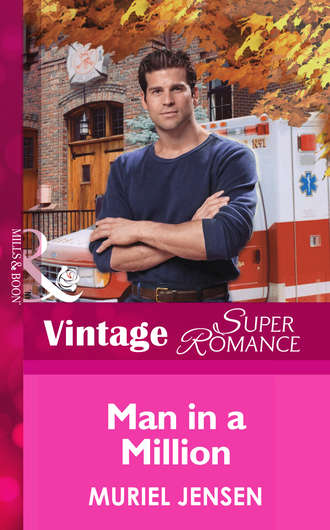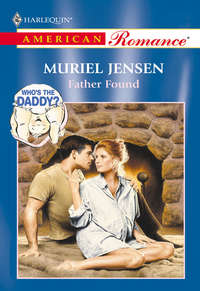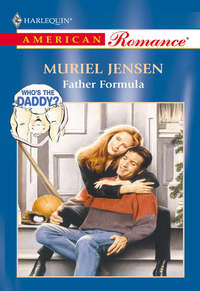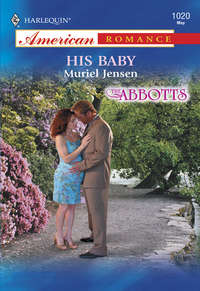
Полная версия
Man In A Million
“He’s Mike Miller, the new guy on nights,” she supplied, her cheeks becoming a little pink. “And he works his days off for Whitcomb’s Wonders, just like you two. That makes him sort of preapproved.”
Hank Whitcomb, Addy’s son, had begun a sort of temp agency for craftsmen several years ago that now provided a broad variety of services for the homeowner or businessman. Whitcomb’s Wonders provided plumbing, electrical work, carpentry, gardening, furnace maintenance and a variety of other services. Randy worked with the janitorial crew on his days off. Chilly was on the gardening team. The simple work was a welcome relief from the life-and-death pressure of being a paramedic.
It was a boon for all of them to work part-time while going to school, raising children or living other dreams.
“What’s he do?” Randy asked.
“Carpentry,” she replied. “Jackie Whitcomb assures me he’s a gentleman. He redid the cabinets in their kitchen.”
Jackie was Hank’s wife and the mayor of Maple Hill. Her judgment could be trusted.
“Okay, then,” Chilly said. “But we want a full report tomorrow.”
“We’ll see.” The telephone rang and she picked it up. They waited to see if they were needed. She put a hand over the receiver. “It’s Mark and Charlie. They’re finished at the school and on their way back. Go have your coffee.”
Randy and Chilly loped across the lawn, headed for the bakery a block away. Randy glanced back in the direction of the driveway, absently wondering if the newly washed ambulance left sufficient room for the vehicle returning from the school, when he noticed a dark object on the pavement. He veered toward it and saw that it was black leather and shaped like an envelope. A light chain attached to it had a broken link on one end.
“What is that?” Chilly asked as Randy bent to pick it up. “Looks like a trucker’s wallet.”
Randy turned it over in his hand and, seeing no identification, unsnapped it and looked inside.
There were quite a few bills in it, some of small denomination, but a few twenties, and a lot of change. Glued to the inside of the flap was a business card with the Berkshire Cab telephone numbers on it.
“Ah,” Chilly said, looking over his shoulder. “It belongs to the lovely Miss O’Hara. What’s that?” He pointed to something tucked behind the bills.
Randy pulled out a foil wrapper that had been folded over. It was half of a chocolate bar. “Seems the lady has a chocolate habit.”
“Is that the first of your scientific observations?” Chilly asked with a grin.
Randy snapped the leather envelope closed. “I’ll take it back to Kitty. I’m sure the first time the lady tries to make change this afternoon, she’ll notice her missing wallet and call.”
Chilly snickered and followed as Randy hurried back to the office door, ran inside with the wallet and explained briefly to Kitty what had happened. “I don’t know,” he said when Randy reemerged. “It was weird. She stared at you as though she couldn’t believe you were real, yet she couldn’t wait to get away from you.”
“There’s money involved—she’ll call.” Randy started off again for the bakery. “And I do have this sort of mesmerizing effect on women. They can’t help but stare at me.”
Chilly responded to his teasingly conceited claim with the same matter-of-factness. “You have a similar effect on men, actually. We all thought evolution had filtered out the ugly and stupid, and yet, here you are. It makes one stare.”
“That’s it,” Randy replied. “Coffee’s on you.”
CHAPTER TWO
PARIS HAD NOTICED HER wallet was missing when she dropped off old Mr. Kubik at the senior center. He paid his fare with exact change and gave her a quarter tip—a routine he’d followed every week for eight months. She had a standing order to pick him up every Tuesday afternoon. She went to slip the money in the wallet always tucked under her right leg on the seat, but it wasn’t there.
She felt a moment’s panic. It had been a good day. She’d had that trip to Springfield, the generous Shriners on a tour of New England after their conference in Boston, and a lot of short hops from the nursing home that helped her make up in volume what the seniors couldn’t pay in tips.
She struggled to remember where she’d been, then concluded she had to have lost it at the fire station. She’d changed a twenty for Starla McAffrey and she’d had it then. Her next stop had been the fire station. Then she’d picked up Mr. Kubik.
Well. She wasn’t going back there. Prue, who drove whenever Paris needed a break, had promised to drive a few hours for her tonight while she made some phone calls. When her sister, Prue, had first returned home, she’d driven a full shift, but business was slow at night, and she’d taken a job at a dress shop instead. Paris would charm her into stopping to pick up the wallet.
Paris then remembered she was supposed to pick up her sister at the library in—she glanced at her watch—ten minutes. She would have to brace herself as she always did to deal with the misnamed Prudence. It was easier when their mother was home. Prudence took after Camille Malone with her bright beauty and her mercurial personality. They always had a lot to talk about, which left the quieter Paris to attend to the practical side of their existence. She did the grocery shopping, paid bills, kept up the checkbook.
She’d never minded that her mother and sister were beautiful and that she was simply passably pretty with a talent for steadiness and responsibility. It meant she took after her father, Jasper O’Hara, a kind and practical man who’d kept their lives together while Camille acted in New York or modeled in L.A. He’d been an accountant and he’d died of a coronary five years before.
Then that comforting sense of who she was exploded a year ago when she was taking an investigations class that involved blood testing and blood typing. She’d tested her own blood and discovered she was type A, scientifically impossible when both her parents were type O. Several years ago, her parents had given blood at a Red Cross blood drive and her father had come home joking that they were “Oh, oh,” giving it the inflection that suggested trouble. He’d said that that exclamation usually applied to everything they did.
It certainly applied at that moment when she tested her blood a second and then a third time. She couldn’t be Jasper O’Hara’s daughter.
She’d rushed home that weekend to confront her mother about it and watched the color drain from her face. Her mother had sat her on the sofa and explained that she was the result of an affair she’d had with a bit actor just before she met Jasper O’Hara.
“Why didn’t you tell me?” she’d demanded.
“Because I married Jasper before you were born and he’s truly been your father. There was no need. We were happy. You were happy. It was…irrelevant.”
Irrelevant? Paris had wanted to argue but had been too shocked to find the right words, the right questions.
“You are who you are,” her mother had insisted, “and it doesn’t matter a damn who your father was. Besides,” she’d added, almost as an afterthought, “he’s dead. He was killed in a car accident right after you were born.”
Paris had insisted on a name.
“Jeffrey St. John,” her mother had finally revealed. “He’s dead, Paris. It doesn’t matter. Jasper O’Hara was your father.”
Paris had gone back to school but found herself unable to focus on her studies. She felt as though the very foundation of her life was cracked and unable to support the future she’d planned.
She’d come home, needing a dose of the stability of her old life before she could decide what to do about her future. She knew that didn’t make sense because her old life was based on her mother’s fabrication. But even though Jasper O’Hara hadn’t been her biological father, he’d been her biggest fan, and there was comfort in being where he’d been.
It saddened her to think that the steadiness that she’d always thought had come from him hadn’t. So where had it come from? A bit actor? Somehow, that seemed unlikely.
She reached instinctively for the chocolate stash in her wallet, forgetting that it was at the fire station. Great. Broke and without chocolate. Life was a cruel master.
With no pickups pending, Paris pulled into a parking spot across from the Common to wait for Prue.
The sight of the Maple Hill Square, or Common, had a grounding effect on her. Life here went on very much as it had two hundred years ago, though the Maple Hill Mirror had up-to-the-minute equipment instead of the old labor-intensive printing method that required inking by hand and rolling one sheet at a time. The early residents of the town had never heard of the mochaccinos produced at the Perk Avenue Tea Room down the way, and would have been horrified by the lengths of the skirts in the dress shop window.
Otherwise, the restored colonial buildings that framed the square looked the same, a colonial flag flew, and Caleb and Elizabeth Drake, who’d once fought the redcoats, still stood on the green, their images bronzed to remind Maple Hill of its heritage.
This was part of what she’d come home for, Paris thought. The eternity of life here, roots in the deep past, finger on the pulse of the future. To someone who felt lost, it provided a handhold on permanence.
Prue probably never felt lost. She had the temperament of an artist, but seemed always so sure of herself.
Now she was part of a committee headed by Mariah Trent to raise funds for an addition to the library and more books.
Prue met Mariah while volunteering at the Maple Hill Manor School outside of town. Mariah had once been a dorm mother there, but now had a husband and two adopted children, and was the backbone of community fund-raising.
When Prue had been living in New York with her senator husband, she’d apprenticed with Shirza Bell, a famous couturier. Prue’s life long dream had been to design clothes, and though she now helped to make a living for the three of them as Paris and their mother did, she still sketched at night and designed in her dreams.
Paris was jealous of her passion—and her face, and her body, and her wonderful ease with people.
She could see her coming from across the street. Late afternoon traffic was light, but Prue Hale stood out like a flame in the cool sunlight of late September. She was several inches shorter than Paris and attractively round without looking plump. Her hair was long and golden and always flying around her in appealing disarray. She had a penchant for long skirts and sweaters, and always looked like a social butterfly on her way home from afternoon tea.
Today, her skirt was a slim gray houndstooth, and she wore a dusty-rose sweater and a brightly colored shawl with a black-and-bright-pink pattern, which hung loosely on her shoulders. She had on black leather shoes with a small heel, a matching pouch purse, and a smile Paris could read from yards away. Paris wondered if Randy Sanford would change his mind about wanting to date her if he could see Prue.
Something good had happened to her sister. Paris would have to listen to every detail as she drove her home. God, she wished she had her chocolate.
Prue pulled the front passenger door open and fell into the cab, filling the small space with the fragrance of White Diamonds.
“Hi!” Her breathy voice burst into Paris’s silence. “You’ll never guess what happened!”
Paris pushed away every other thought to talk to her sister. A conversation with Prue always took up all the space in her head. Randy Sanford resisted being pushed, but she pushed harder.
“What?” she asked.
“Mariah wants to have a fashion show for the fund-raiser, and guess what else?”
“What else?”
“Featuring my designs!”
“That’s wonderful, Prue!” Paris was sincere. Prue’s face was glowing, and Paris could only imagine how much it meant to her to finally have a place to show off her clothing line. Granted, it was just a small community function, but word had a way of getting around. And after finding her husband in flagrante delicto with an intern in his office, Prue’s ego needed the boost. Then Paris began to worry about the practical aspects of the opportunity. “But won’t it be hard to transfer the designs to the real thing? How much time do you have?”
“A little over four weeks,” Prue replied, her excitement dimming just slightly. “I thought about that. But I think I can do it. If you help me.”
Pulling away from the curb, Paris was filled with trepidation. “Prue, I can’t sew a stitch.”
“I know, I know. I can handle that part. But I need you to model.” She said those last words quickly, probably anticipating Paris’s reaction.
“What?” Paris demanded, stopping right in the middle of the narrow, tree-lined road. Someone behind her honked. She drove on to the red light at the corner. “Are you crazy? I don’t know a thing—”
“You don’t have to know anything,” Prue argued eagerly, “you just have to have the body, and you do. You’re perfect. Tall, slender, long legs, great hair. You’ll be perfect.”
Paris stared at the passing traffic and determined that God had to be paying her back for all the tricks she’d played on Prue in their youth. Her little sister had been trusting and gullible, and it had been easy to convince her that candy was poisonous and should always be tested by a big sister, that curly hair reflected dishonesty that could only be overcome if the curls were cut off, that she’d been left as a baby at the secondhand store where their mother and father had bought her for a bargain.
Curious, Paris thought now, that she might have been the one abandoned to someone else’s mercy, considering her doubtful beginning.
“Prue, I’ll only embarrass you,” she pleaded.
“You will not,” Prue insisted. “And I’ve been thinking about it. I knew you’d need incentive, so I thought we’d make a deal.”
A deal? Oh, this couldn’t be good.
“I’ll design and sew during the day,” she bargained, “then drive for you from four to midnight, if you’ll do this for me. You can make more money if Berkshire Cab is available from nine to twelve. There are all those people going home from late meetings who hate to drive after dark, or in the wind and rain.”
“But you’ll be driving after dark. And the wind and rain will be here before you know it. I don’t like it.” It would be nice to be able to expand her hours, but 6:00 a.m. to 6:00 p.m. was the best she could do alone. “And what about your job at the dress shop?”
Prue sighed. “Patsy’s closing up. I’ve got my walking papers. Will’s been transferred to New Jersey and they’ll be gone in a couple of weeks. I need employment, anyway.” She hesitated a moment, then added, “And you wouldn’t deprive me of this chance, would you?” Prue’s tone contained just the right element of little-sister pleading.
Paris groaned. “Prue, I’ll model for you, but you don’t have to drive for me.”
“Yes, I do,” Prue insisted. “Nobody’s complained that I took a simple minimum-wage job so I could continue to play with my designs. Well, this is my chance to make something of them and make a bigger contribution to the household. Please don’t argue with me. I’m starting tonight, anyway, right? You have calls to make, or something?”
“Prudie…”
“You’ll have to cut back on the chocolates until after the show,” Prue said.
Paris groaned. “You could have told me that before I agreed.”
“Not if I wanted you to help me.”
“One thing.”
“Yeah?”
“I think I dropped my cab wallet at the fire station. Would you mind picking it up tonight?”
Determined to look casual, Paris stared at the road as she felt Prue turn to look at her. “What were you doing there?”
“I…had a fare.”
“A fireman called a cab when they have those great trucks to ride in?”
Paris ignored her, concentrating on the turn that would take her to Lake Road.
“Did you go to see that EMT Addy Whitcomb’s trying so hard to fix you up with?” Prue said it teasingly, but when Paris didn’t reply and her color rose instead, Prue shifted in her seat and asked excitedly, “You did?”
“Just to tell him that I wasn’t interested in dating him,” she corrected quickly, “and to assure him that I knew he didn’t want to date me, either. I’ve… I’m just clearing the decks. I’m tired of my life being this mass of confusion.”
Prue was silent for a moment. “Is this the thing about your father again?”
“I’ve just got to get some answers,” Paris said with a shrug of her shoulder, “and it’ll be easier while Mom’s gone because I know how she hates my interest in it. I know you don’t understand.” She forestalled her sister’s protest with a raised hand. “I don’t expect you to. Just let me do what I have to do without criticism, okay?”
“I wasn’t going to criticize,” Prue assured her. “I was going to tell you that I understand what motivates you. If the man I’d thought was my father my whole life turned out not to be, I’d want some answers, too. I just don’t understand why you think it’ll change anything. He’s dead.”
Paris blinked, a little surprised by Prue’s empathy. “I know. I just want to know more than Mom’s willing to tell me.”
“Okay. But a search for details about your father doesn’t mean you have to dismiss the possibility of having an interesting man in your life, does it?”
“He doesn’t want me, either. He apparently has his own reasons for avoiding Addy’s romantic maneuvers.”
Prue nodded knowingly. “His fiancée died.”
Paris glanced at her sister. “How do you know that?”
“Mariah knows him. He works for Whitcomb’s Wonders, you know. He’s on a janitorial crew that services her husband’s building. Randy and his fiancée had been through medical school together and were interning in the same hospital when she got cancer.”
“Jeez.”
“Yeah. What did you think of him?”
That was hard to simplify into words. He was handsome, annoying but oddly appealing, a little bossy, yet seemingly concerned for her welfare. She didn’t know how she felt about him—just that an image of him lingered in her mind.
“Um…” She shrugged again, trying to minimize his impact on her. “Nice-looking, thinks he knows everything, tries to be charming. You know, typical guy.”
“I don’t think he’s very typical. Mariah says she saw him save a man’s life at the gym. The man collapsed on a treadmill, wasn’t breathing, and he brought him back. The ER doctor said he wouldn’t have made it if Randy hadn’t been there. I know it’s what he’s trained to do, but Mariah thought it was pretty amazing close-up.”
Paris could imagine that that was where his confidence came from. Saving a life was pretty big stuff.
“About the wallet…” She tried to divert the conversation.
“I’ll get it. But you can search for information about your father,” Prue insisted, “and still get to know Randy.”
Paris pulled into the driveway of their home and left the motor running, turning to her sister with a firm expression. “If you pressure me and cause me stress,” she warned, “I’m liable to turn to chocolate. And if you expect me to wear that red wool thing you showed me the sketch of the other day…”
“All right, all right,” Prue said defeatedly. “I just think if you’re presented with the gift of a nice guy with romance on his mind, you should take it. But what do I know? Thanks for the lift. I’ll take over for you at four.”
“Six,” Paris corrected. “Have a good dinner, be sure to fix yourself a thermos of coffee, and I’ll turn the cab over to you. If you promise you’ll keep in touch throughout the night.”
“I promise.”
“All right. See you at six.”
“Do I get to say ten-four?”
“No.”
CHILLY HAD ALREADY GONE home to his wife, and Randy had finished restocking their vehicle and was in the office, checking out, when he noticed the leather wallet with the broken chain still sitting on Kitty’s desk. There was no note on it to indicate that Kitty had spoken to its owner, a procedure she usually followed when something was left in an ambulance.
Randy opened it, consulted the business card inside the flap and dialed the number. He would show Paris O’Hara that he could be businesslike even if she couldn’t.
A familiar voice answered. “Miss O’Hara?” he asked.
“Ah…used to be,” the voice replied. “Now I’m Mrs. Hale. Actually, that’s not quite right because I used to be that, too. But I’m not anymore.”
Good grief. Her sister? Did everyone in her family think everything to death?
“Berkshire Cab?” He tried another tack.
“Yes,” the voice replied. “Always Safe, Always Friendly.” She recited the slogan on the business card. “Can I pick you up?”
Now, there was a line a man liked to hear. Well, most men did. With his determination to have relationships on his terms, he had to be selective.
God, he was sounding just like the O’Hara sisters.
“I’m calling from the Maple Hill Fire Station,” he said. “We have your wallet.”
“Aah.” There was something speculative in the quiet way she drew out the word. “Randy Sanford?”
“Yes,” he replied.
“My sister asked me to pick it up, but I’ve been busy since I came on. I’ll be there in about ten minutes.”
He met her in the driveway so that she wouldn’t have to get out of the cab. But she seemed to want to. She leaped out from behind the wheel and offered her hand with a warm smile.
“Prudence O’Hara Hale,” she said as he shook her hand. “I guess if I just use both names, I don’t have to explain as much.” She laughed over her earlier dithering.
“You don’t have to explain at all,” he said, handing her the wallet. “I’m just a stranger, trying to return something your sister dropped.”
“Ah, but you’re not a stranger at all,” she corrected him, accepting the wallet. “Thank you. Addy makes you sound like a cross between George Clooney and the surgeon general.”
He had to laugh at that. Addy was enthusiastic about her matchmaking avocation.
“I suppose my sister came on all cool and distant,” Prudence guessed, opening the wallet and peering inside.
“She did,” he agreed.
She glanced up at him. “She’s really not like that at all. She’s usually very warm and open, but she’s got a crisis going at the moment.”
He nodded. “Don’t we all.”
“I’m sorry about your fiancée,” she said without warning. It always unsettled him when someone brought it up when he wasn’t expecting it. Often conversations led that way and he was prepared. But sometimes he wasn’t.
“Thank you,” he replied, wondering where she’d learned that information. Addy?
“Mariah Trent is a friend of mine, too,” she explained. “She’s also hoping you and Paris give each other a chance.”
“Your sister was pretty adamant that she wasn’t interested.”
“She lied,” Prue said as though completely convinced that was true. “She was a little flustered after she left here. Paris is never flustered.”
“Really.”
“Yes. She thought you were handsome and charming. She tried not to make it sound as though those were good things, but I think they made an impact on her. And she’s trying to ignore it because she’s struggling right now.”
He wasn’t sure if it was okay to ask what she was struggling with. Then deciding honesty had always served him better than calculation, he asked, “A man?”
She smiled, but there was curiously little humor in it. “Yes, but not in the way you’d think. She could use a friend. Sometimes a man understands what a devoted mother and sister just don’t get.”
That was cryptic. He wasn’t really into mysterious women. He liked them openhearted and easy to understand. Still, this woman was warm yet distant—a contradiction in terms. There was that scientific element that fascinated him despite his usual preferences to the contrary.
“You didn’t eat the chocolate,” Prue noted, closing the wallet.
“I thought it was probably as important to her as the money.”
Prue grinned. “Even more so at the moment. I’m a dress designer on the side, and she’s going to model for me at a library benefit. I made her promise to cut way back on chocolate.”









